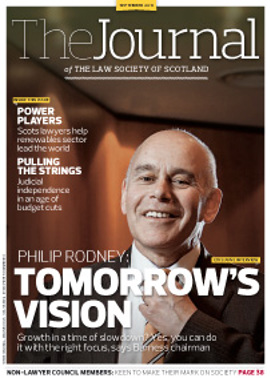President's column
First, I hope you are all impressed with our new-look Journal. I will receive my printed edition at the same time as everyone else but, from the mock-ups I’ve seen, the refreshed design certainly looks stylish and lively, while the content will remain as informative, thought-provoking and authoritative as ever, with the added promise of more online exclusives. Despite the improvements, costs will actually reduce due to changes in the way the magazine is produced, providing even better value for money for members. Credit to Peter and his team for the strenuous efforts that have gone into ensuring a successful relaunch.
It is with some satisfaction, then, that I get my contribution to the new venture under way with good news – progress on the legal aid front. Thanks to our criminal legal aid negotiating team, backed ably by our staff and with some input from the office bearers, a working interim police duty scheme has been established.
However, two things must be stressed. First, the scheme – originally set up following the Supreme Court’s ruling in the Cadder case – is interim. We must push forward our own proposals for a more workable long term arrangement. Hopefully, the participation of private practitioners will greatly improve the scheme and, in turn, inform the discussions for a more permanent settlement after the publication of Lord Carloway’s report.
Secondly, as a profession, we act most effectively in the interests of our members and the public when we work together, put aside our legitimate differences and support the Society in dealing with Government. The substantive changes to the police station duty scheme were secured because the solicitors affected presented a united front to ministers, underlining how much more effective and respected we are as a profession when we pursue a common cause.
My predecessor, Jamie Millar, sought unity and mutual respect – an approach that is clearly paying dividends.
Showcase to the world
Of course, the Society is committed to promoting Scotland’s solicitors in other jurisdictions as well as here at home. And where better to do so than at the major annual conferences of the American Bar Association and Canadian Bar Association (CBA)? Every opportunity was taken to showcase the Scottish profession, while also ensuring that our long-established, distinct legal system is not only understood but appreciated by delegates from around the world.
In a session on discovery (of documents and witness evidence), I gently intervened to remind the London-based speaker – and audience – that he was confusing UK law with English law and talking solely about applications to the High Court in London. Unfortunately, my intervention prompted a rather defensive response, though it was important to remind delegates that England is only one part of Britain, and Scottish firms operating in London can advise on the law in the whole of the UK.
In terms of learning useful lessons from other jurisdictions, the delegations from Australia, as well as England & Wales, provided valuable insights into their experiences of alternative business structures. The Americans painted a worrying picture of an underfunded justice system, though they at least gave us lots of ideas for dealing with budget cuts in Scotland. The media coverage generated by the CBA’s opposition to unpopular Government policy also raised a few eyebrows among delegates.
Other useful discussions took place about privacy, client confidentiality, money laundering, diversity, regulation of paralegals, integrating in-house counsel, post-qualifying education and specialisation, ethics, and solicitor/client privilege. Material collected at the conference has been passed on to committee secretaries and members of staff to follow up.
Serious business
As I write, final preparations are being made for the Society’s own Law in Scotland conference. The Update team, supported by the wider executive, has put together a more varied programme than ever before. I am sure all who attend will find it worthwhile, not least because the event provides a fantastic opportunity to come together with colleagues from across the profession.
Following the conference, I am looking forward to meeting the Stornoway faculty, and then attending this month’s special general meeting. A Council meeting at the beginning of September made a number of detailed changes to the existing draft of the constitution before agreeing to extend the timetable for implementation. Those who supported further scrutiny presented strong and passionate arguments, which won the backing of their Council colleagues.
However, the important business of agreeing next year’s practising certificate fee and considering the new corporate plan remain on the SGM agenda. I urge members to play their part in our decision-making process.
In this issue
- Maxwell Fyfe and the origins of the ECHR
- Introducing the European Law Institute
- Social media are here to stay
- Property points
- Paving the way for a new approach to elderly care
- Fair trial for the European Court of Human Rights
- Stalking: the hidden dangers, the silent crime
- Paul Wade: An appreciation
- Opinion
- Book reviews
- Reading for pleasure
- Council profile
- President's column
- Finger on the pulse
- Sharper focus
- The ties that bind
- Trawling for revenue
- The generation game
- Through the hoops
- Directors: to be, or not to be?
- Shoe stoppers
- Selection blues
- Conference calling
- ARTL: is there a fix?
- Building a better Buildmark
- Secure knowledge
- Key changes in compliance
- Guarantee Fund costs change
- Law reform update
- Strangers in the House
- Property points (1)
- Ask Ash
- Debt and asset recovery specialism goes live






